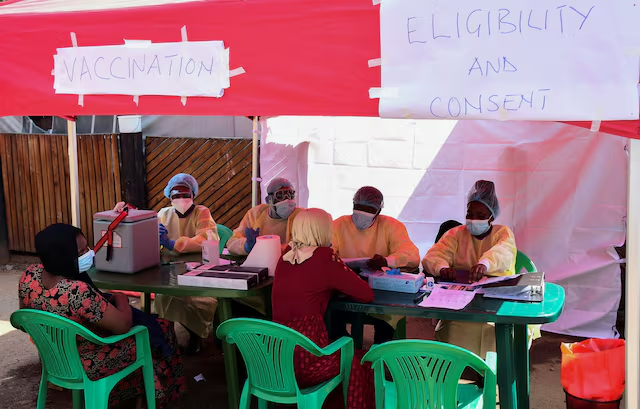Ugandan doctors attend the contacts of a patient who had tested positive, during the launch of the vaccination for the Sudan strain of Ebola virus, with a trial vaccine at the Mulago Guest House (Isolation centre) in Kampala, Uganda, February 3, 2025
March 4 — The United Nations has launched an emergency appeal to raise $11.2 million to help fund Uganda’s response to an Ebola outbreak that has killed two people, after the country’s health budget was strained by U.S. cuts to foreign aid.
In a statement sent out on Tuesday, the U.N. said the funds would cover the Ebola response from March to May in seven high-risk districts.
“The goal is to rapidly contain the outbreak and address its impact on public health as well as associated social-economic life of affected people,” said Kasonde Mwinga, Uganda representative for the World Health Organization (WHO), a U.N. agency.
Uganda has traditionally relied heavily on the U.S. for its health sector funding.
The East African country declared the outbreak of the highly infectious and often fatal haemorrhagic disease in January in the capital Kampala after the death of a male nurse at the East African country’s sole national referral hospital.
A second Ebola patient, a four-year-old child, died last week, the World Health Organization said, citing the country’s health ministry.
Uganda’s 10 confirmed cases have been linked to Ebola’s Sudan strain which does not have an approved vaccine.
During the last Ebola outbreak in 2022-2023, the United States provided $34 million to fund case management, surveillance, diagnostics, laboratories, infection prevention and control among other activities, according to a U.S. Embassy report.
But President Donald Trump’s administration imposed an aid freeze and U.S. funding to Uganda’s health sector has been slashed, hitting the country’s public health budget, according to government officials.
Dr Janet Diaz from the World Health Emergencies programme told a Geneva press briefing after a trip to Uganda that the agency was already having to temporarily take on aspects of the Ebola response previously done by other groups due to the U.S. cuts. These include deploying surveillance teams at border points and the handling of biological samples.
Ebola symptoms include fever, headache and muscle pains. The virus is transmitted through contact with infected bodily fluids and tissue.



